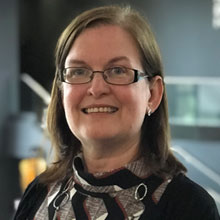13 February 2020
Delivering more GPs with Access to HE

Author
Julie Mizon
Access Manager, QAA
Here’s a big question to start: how do we deliver more doctors for Britain in this new decade?
It’s a hot issue, not only politically, but in the waiting rooms of GP practices up and down the country. The chair of the Royal College of GPs (RCGP) even said last year that waiting times for a GP appointment had become ‘the national conversation’.
In their 2019 manifesto, the Conservative Party committed to delivering 6,000 more doctors in general practice in England by 2024-25. Whatever the target is, it’s generally agreed that, as Paul Garrud of the Medical Schools Council Selection Alliance says: ‘Britain needs more doctors to better serve our diverse population’.
There are many pieces to this puzzle, but I do think that the Access to Higher Education Diploma can be a small but significant part of the solution.
The Access to Higher Education Diploma is a nationally-recognised Level 3 qualification - like an A Level or Welsh Baccalaureate - and it is designed to prepare adults without traditional qualifications for study in higher education. The Diploma is often a second chance for people who didn’t get the qualifications they needed when they were first at school, while it can also offer a change in direction for those who may have had a graduate career already.
There are over 1,200 Access to HE Diplomas to choose from in a wide range of subjects including nursing, social sciences, business and education. However, while over 50% of all current Access to HE students in higher education are studying a healthcare subject, less than 1% are studying medicine at university.
We want to change that. We want to make the Diploma a recognised route into medicine for adults in England, Wales and Northern Ireland.
And here’s how. This week we have announced a new subject descriptor for our Access to HE Diploma in Medicine. A subject descriptor might sound like technical jargon, but it’s the essential framework for any subject. The new framework will allow a level of local flexibility, so Access to HE course providers can shape their courses to meet the specific skills in medicine required in their area. However, what we’re delivering here is nothing less than a national framework - a framework that guarantees greater consistency across Access Diplomas in Medicine in England, Wales and Northern Ireland.
Local flexibility is one of the great strengths of Access to HE courses, but with Medicine it has been important to address what medical schools look for and better embed those needs nationally across the Diploma.
To that end, we developed the new framework with a working group made up of Access Validating Agencies, Diploma providers and three medical schools at the University of Plymouth, Edge Hill University and Keele University. We also consulted with the Medical Schools Council - all to ensure we build a course that delivers what the medical schools themselves want and need.
This is an exciting step forward. I think we’ve developed a new framework that will deliver a more successful route into medicine for adults. It will allow medical schools greater confidence in recruiting Access to HE students, and it will provide better access into the profession for adults and those without traditional qualifications. I can’t wait to see the impact it will have in the coming years.
